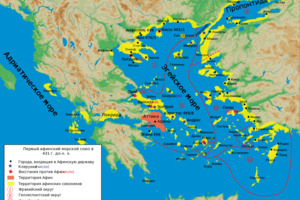Delian League
The Delian League, also known as the First Athenian Naval League or the Delian Confederacy, was a union that emerged from the broader Greek alliance against the Persians after the Spartans, who had repeatedly failed to maintain naval hegemony following the Battle of Plataea, ceded it to the Athenians in 477 BCE. Aristides and Cimon played prominent roles in the creation and expansion of the Athenian naval league.
The objective of the league was to wage war against the Persians, liberating Greeks still under Persian control and seeking revenge for the Persian invasion of Greece. The Athenians annually elected ten Hellenotamiai to oversee the league's treasury, which was located on the island of Delos in the sanctuary of Apollo. The league was intended to be a symmachy for eternity. It fostered trade and ensured the security of communications, which earned support from merchants and craftsmen. The main goal was achieved with the signing of the Callias Peace around 449 BCE, after which Athens began to exhibit a clearer desire to transform the league into its own protectorate. Athenians governed the affairs of the league with the assistance of representatives from other allied states but could easily exert pressure on them by amassing a majority of votes from representatives of smaller cities (all allied states had equal voting rights).
Initially, it was decided that states could contribute to the league's cause by providing ships or money, but soon monetary contributions (phoros) became preferred to achieve greater uniformity in the outfitting of ships and crews. Aristides was entrusted with the allocation of these contributions. Only large states such as Samos, Chios, Lesbos, and possibly Phasis and Naxos were recognized as independent taxpayers. The remaining cities were divided into three districts: Insular, Ionian, and Hellespontine. Later, two more districts were added: Thracian and Carian.
By 454 BCE, the league consisted of 208 voluntary and coerced members. The total tribute amounted to 460 talents per year, but in 425-424 BCE, Cleon increased it to 1460 talents. Over time, allies became more willing to provide money instead of ships. This increased Athenian power within the league, allowing them to resort to force to extract money from negligent payers and, by subduing rebels, turn them into subjects. They demonstrated this approach for the first time with the Naxians in 469 BCE.
Taking advantage of rumors about the appearance of a Persian fleet in the Aegean, the Athenians relocated the league's treasury from Delos to Athens in 454 BCE. By this time, all cities except Samos, Chios, and Lesbos were Athenian subjects. The synedrion of allies was apparently destroyed, and the league transformed into an Athenian maritime empire. One-sixtieth of the entire tribute went to the treasury of the goddess Athena. The Athenians began to interfere in the internal affairs of allied cities, maintaining garrisons and demanding allies appear before Athenian courts for more important cases and appeals, among other measures. Despite strict Athenian measures, city after city began to revolt against the league. A vivid example of this is the story of Samos' secession in 440 BCE. The Athenians tried to compensate themselves for the revolts with new tribute amounts. At the beginning of the Peloponnesian War (427 BCE), they harshly punished the seceding citizens of Mytilene and sent their cleruchs to the island. In 426 BCE, they demonstrated their "naval dominance" akin to Peisistratos by cleansing Delos of graves and burials, and henceforth forbidding births and deaths on the sacred island. Mass defections by allies began after the Sicilian catastrophe, and in 404 BCE, the league was dissolved.



